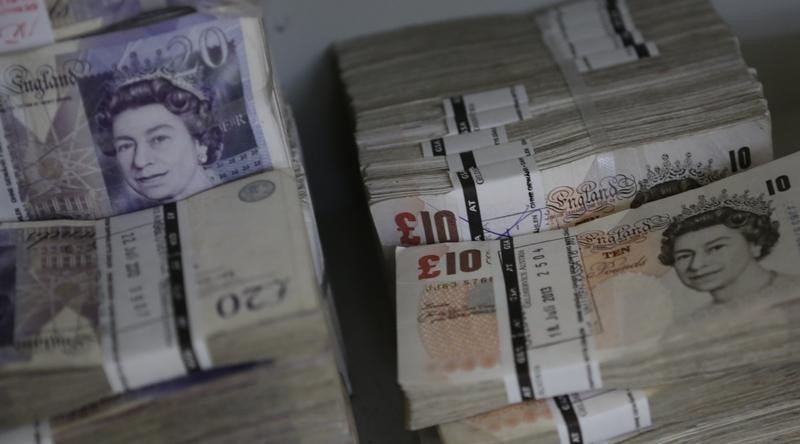Intel stock extends gains after report of possible U.S. government stake
* European shares, S&P 500 futures down
* New coronavirus strain shuts much of UK, overshadows U.S.
stimulus
* Pound hit, Brexit talks drag on with no deal
* Oil, copper prices slide; dollar higher
(Updates throughout, changes byline, dateline)
By Sujata Rao
LONDON, Dec 21 (Reuters) - European shares fell 2% on
Monday, the dollar strengthened and market volatility surged
amid growing unease over the economic impact of a new
coronavirus strain in Britain which has seen several European
countries shut their borders to the UK.
The news of the new strain, said to be up to 70% more
transmissible than the original, has put some 16 million Britons
under tougher lockdowns and has overshadowed U.S. lawmakers'
agreement over a long-awaited stimulus bill.
Prime Minister Boris Johnson will chair an emergency
response meeting to discuss international travel and the flow of
freight in and out of Britain. Coinciding with the lack of a post-Brexit trade deal ahead
of the Dec. 31 deadline, those developments sent the pound
almost 2% lower at $1.3272 GBP=D3 . Losses of more than 1% on
UK equities .FTSE .FTMC were led by 6%-7% tumbles at banks
Lloyds and Barclays.
German shares fell around 2%, while pan-European travel and
leisure stocks lost more than 5% .GDAXI .SXTP .
MUFG analysts noted the tougher restrictions might have to
remain place for months until more people are vaccinated.
"As a result, the economic slowdown will prove deeper and
extend further into next year. It will dampen optimism over a
stronger economic recovery in 2021," they told clients, noting
this setback could necessitate more monetary stimulus.
Volatility, a measure of price swings on an asset class,
swung higher across the board, with Wall Street's "fear gauge"
the VIX -- rising above 25% for the first time since Dec. 11
.VIX .
Implied overnight sterling volatility hit approached
nine-month highs GBPONO=FN
Earlier, Asian shares outside Japan .MIAPJ0000PUS dipped
0.2% after hitting a string of record peaks last week. Japan's
Nikkei .N225 shed 0.4%, off its highest since April 1991.
Futures for the S&P 500 ESc1 were down 0.6%, despite
opening stronger after U.S. Senate majority leader Mitch
McConnell said an agreement had been reached by congressional
leaders on a roughly $900 billion COVID-19 relief bill.
The setback could upend bullish bets on commodities such as
oil and copper which were expected to benefit from a growth
upswing next year.
Brent crude futures dropped more than 3% while copper, a key
economic growth barometer, fell off the $8000-per-tonne mark it
recently scaled for the first time since 2013 LCOc1 CMCU3 .
"Investors' rosy expectations for 2021 have suddenly
vanished due to a new variant of the virus," Kazuhiko Saito,
chief analyst at commodities broker Fujitomi Co, said.
DOLLAR TIME
The risk-off picture provided a boost to safe-haven assets,
from government bonds to gold to the U.S. dollar. Speculators
who had taken bearish dollar positions to the biggest since
September, trimmed those in the week to Dec. 15, data showed on
Friday The dollar index =USD rose as high as 90.68, up almost
half a percent, well off last week's 89.723 level that marked
the lowest since April 2018.
The euro edged lower at $1.222 EUR= while the yen firmed
slightly at 103.5 per dollar JPY= .
The greenback also found support from a Nikkei report that
Japanese Prime Minister Yoshihide Suga had told officials to
ensure the dollar did not fall below 100 yen. Gold prices meanwhile climbed to six-week highs at $1,896 an
ounce XAU= while U.S. and German bonds rallied, with yields
down three to four basis points.
The U.S. two-year/10-year Treasury yield curve, another
important gauge of growth expectations, flattened a touch
U2US10=TWEB . The curve had steepened on Friday to the highest
levels in almost three years amid optimism about the stimulus
bill. <^^^^^^^^^^^^^^^^^^^^^^^^^^^^^^^^^^^^^^^^^^^^^^^^^^^^^^^^^^^
Asia stock markets https://tmsnrt.rs/2zpUAr4
Asia-Pacific valuations https://tmsnrt.rs/2Dr2BQA
^^^^^^^^^^^^^^^^^^^^^^^^^^^^^^^^^^^^^^^^^^^^^^^^^^^^^^^^^^^>
